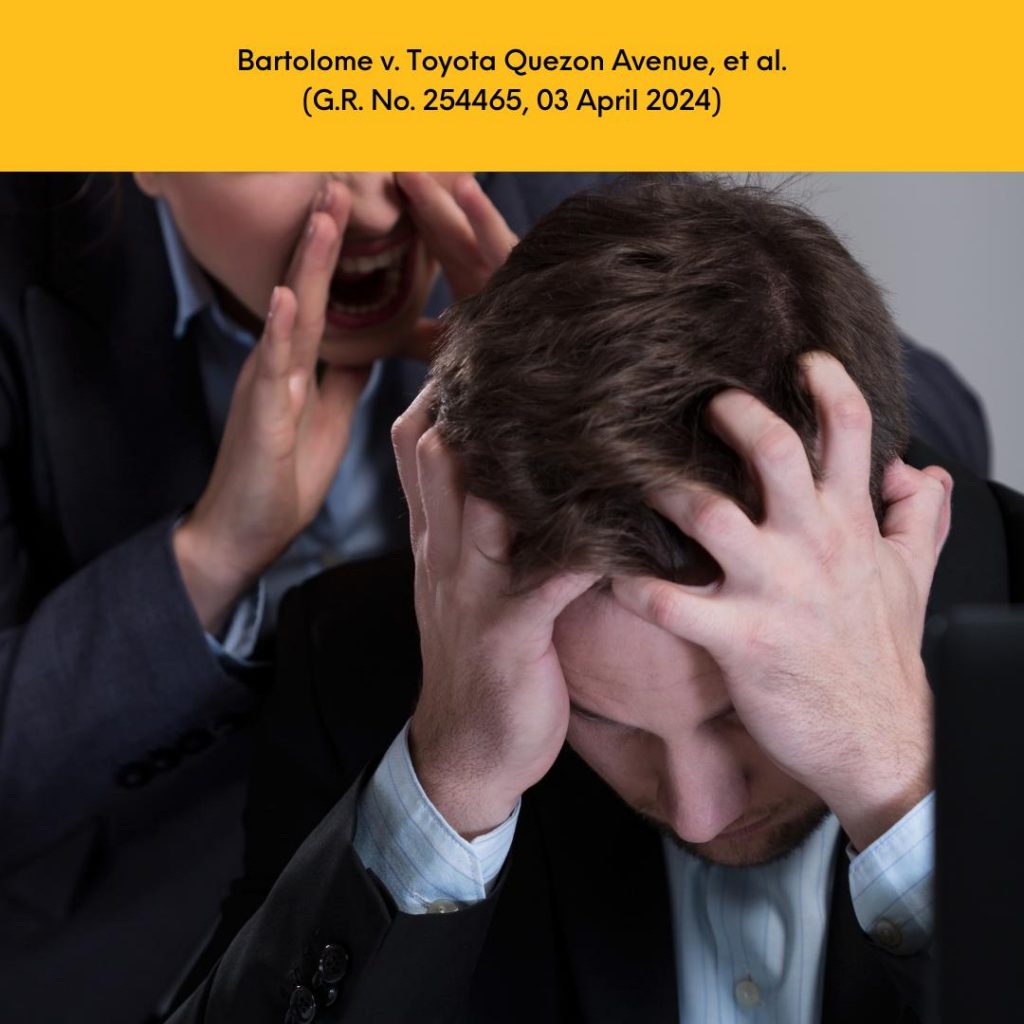
Published 4 April 2025, The Daily Tribune
In today’s increasingly competitive job market, the dynamics between employers and employees is constantly evolving. A recent Supreme Court ruling has brought renewed attention to the concept of constructive dismissal, highlighting the responsibility of employers to maintain a fair and respectful work environment.
The case of Bartolome v. Toyota Quezon Avenue, et al. (G.R. No. 254465, 03 April 2024) revolves around Bartolome, a marketing professional who worked for Toyota Quezon Avenue, Inc. (TQAI). Bartolome’s journey with TQAI started on a positive note, but over time, a series of workplace incidents created a hostile environment that ultimately led to his resignation—a resignation the Supreme Court later deemed as forced, rather than voluntary.
Bartolome faced several challenges at work, including being accused of habitual absences, disputes over vehicle sales processing, and a sudden transfer to another team. In one meeting, TQAI President uttered unsavory remarks against Bartolome for bringing his lawyer-sibling to a previous meeting about his absences, part of which reads: “Bakit isa lang ba kayong empleyado sa opisinang ito, bakit only child ba kayo? . . . Wag nyo naman kami subukan, tapos magdadala kayo ng tatay/nanay para isumbong kami”.
Later, his accounts were withdrawn, with the Group Retail Manager telling him that, “ayaw ka na pahawakan ng accounts ni Boss . . Accounts nya yan. Siya ang may say.” When Bartolome tried to process a sale under these accounts, the same manager told him, “Hindi ka pwede magrelease sa kliyenteng ito. Pwede mo iprocess pero ipangalan mo sa iba.” His transfer to a new team did not go well either, as his new boss asked him, “[a]no plano mo, magreresign ka?” Eventually, Bartolome received a lower performance rating, which further strained his position within the company. These actions created an environment that was unbearable for Bartolome, leaving him no choice but to resign.
The Court emphasized that as in every human relationship, there are bound to be disagreements. However, when these strong words from the employer happen without palpable reason or are expressed only for the purpose of degrading the dignity of the employee, then a hostile work environment will be created which may make the employer liable for constructive dismissal. Notwithstanding Bartolome’s resignation letter, the Court held that he did not contemplate nor had any intention of resigning from TQAI were it not for the hostile and disdainful actions.
The Court ordered TQAI and its top officials to compensate Bartolome with full back wages, separation pay, commissions, and moral and exemplary damages. Additionally, the company was held liable for attorney’s fees, with the total monetary award accruing legal interest until fully paid.
This ruling sends a clear message to employers: the workplace must be a place where employees are treated with respect and dignity. Ensuring that policies are implemented fairly and that employees are treated with respect is not just a matter of good practice—it is a legal requirement. Thus, employers must foster a work environment where employees feel valued and supported, even when addressing issues such as performance or attendance.
For more of Dean Nilo Divina’s legal tidbits, please visit www.divinalaw.com. For comments and questions, please send an email to cad@divinalaw.com.

